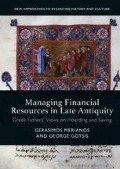Abstract
This chapter draws together the conclusions of the study. As Christianity was progressively identified with the Empire, the Greek Fathers’ views on proper resource management gradually evolved. It was one thing trying to persuade, for example, freedmen to share their surplus with their fellow Christians in local congregations, and another thing to attempt to convince elite members to act accordingly concerning entire cities. Mismanagement of resources in the forms of hoarding, usury and luxury consumption signified indifference to social welfare. A patristic strategy employed to accommodate the mentalities of converted elite members was the transformation of the objective of patronage from civic to ecclesiastical benefaction; thus, the tenets of proper administration of resources concerned both lay and ecclesiastical wealth. Another strategy for strengthening social cohesion through market exchanges further reflects the socio-economic evolution of the early Byzantine Empire.
Author information
Authors and Affiliations
Corresponding author
Copyright information
© 2017 The Author(s)
About this chapter
Cite this chapter
Merianos, G., Gotsis, G. (2017). Conclusions. In: Managing Financial Resources in Late Antiquity. New Approaches to Byzantine History and Culture. Palgrave Macmillan, London. https://doi.org/10.1057/978-1-137-56409-2_7
Download citation
DOI: https://doi.org/10.1057/978-1-137-56409-2_7
Published:
Publisher Name: Palgrave Macmillan, London
Print ISBN: 978-1-137-56408-5
Online ISBN: 978-1-137-56409-2
eBook Packages: HistoryHistory (R0)

